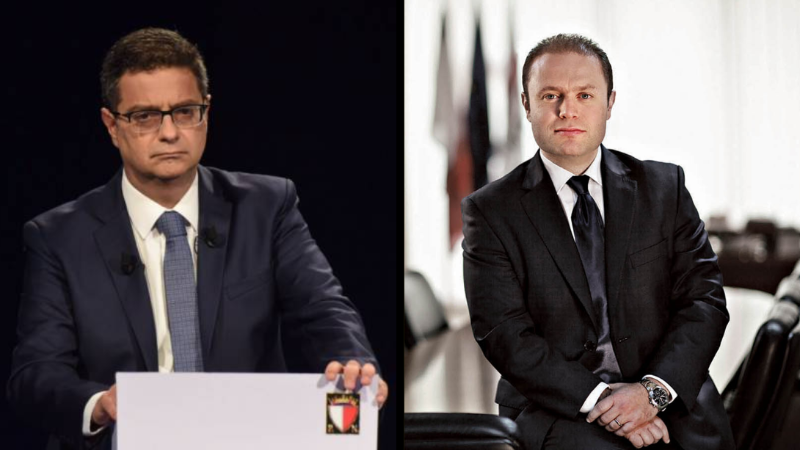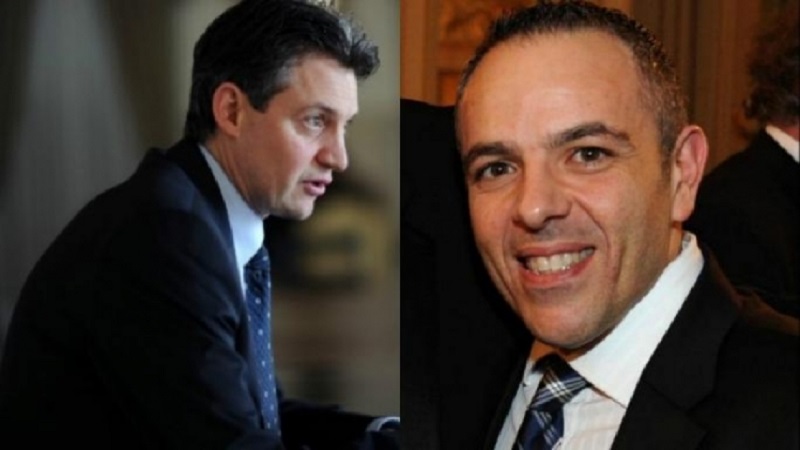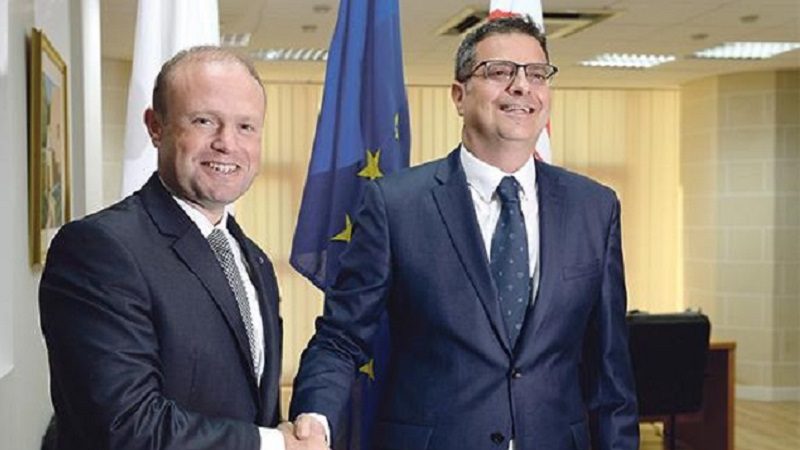The last quarter of 2017 saw a dramatic change in the dynamics of political confrontation, from one pitting Joseph Muscat’s populist leadership against Simon Busuttil more continental brand of leadership to one pitting two ‘strongmen’ against each other. So how has this new political combo worked out in the last quarter of 2017?
Muscat and Delia may have a number of things in common. Both have presented themselves as being anti establishment while sounding pro business.
They may also have moments of bromance. But political necessity is what will probably keep them apart. Faced with dissent in his own Party, Delia is bound to spare no punches in his exchanges with Muscat. It is Muscat who has every interest in weakening Delia in the eyes of PN voters, with his fatal embrace.
This is what we have seen so far in the past three months.
Election highs, moral lows
Both leaders can claim democratic legitimacy and both of them have won handsomely despite being accused of impropriety. Delia is the first political leader in Malta to be elected by rank and file Party members. Delia won the support of 7,734 paid up Party members despite being asked to withdraw from the race by an internal party commission and by former leader Simon Busuttil. This followed Daphne Caruana Galizia’s revelation that he owned a Jersey bank account linked to property in Soho owned by a prostitution ring.
Muscat called an early election after slain journalist Caruana Galizia linked his wife to the ownership of Egrant, the third Panama company set up by NexiaBt immediately after the 2013 election. These revelations followed other related to the Panama Papers focusing on Minister Konrad Mizzi and Muscat’s Chief of Staff, Keith Schembri. Muscat confirmed his 35,000 strong majority. Both elections have been interpreted as signs that good governance is not a priority for the electorate. But it could well have been the case that the alternatives: namely Busuttil’s PN and Chris Said’s leadership bid were not that convincing.
Poll highs and lows

The latest MaltaToday poll put the gap between the two Parties at a staggering 71,000. Another recently published poll put Delia’s trust rating in single digits. In the Times of Malta survey also, held in November, Delia earned a rating of just 3.4 when respondents were asked to rate the leaders on a scale of 1 to 10.
Prime Minister Joseph Muscat was given a rating of 7.5, the same as before the general election. While Delia’s low poll rating reflects a split among PN voters, a huge chunk of which do not trust him, Muscat’s strong ratings suggest that he has not lost any popularity among both traditional PL voters and switchers. While the PN’s sinking fortunes may be blamed on Delia, the Labour Party still owes Muscat for its transformation.
United PL, Divided PN
Muscat remains the undisputed leader of his Party. The same cannot be said for Delia, who still faces dissent in his Party despite strengthening his grip on party structures through the election of loyalists in key posts. Delia also faced an unprecedented backbench rebellion when six MPs including former leader Simon Busuttil refused to support a motion meant to stop a legal notice granting five days of leave to couples who go abroad for IVF treatment.
By presenting himself as an insurgent against ‘the establishment’ in his Party, Delia may have lured back a category of PN activists who felt excluded by the Party’s old guard. By instilling enthusiasm among party activists, Delia may have achieved the first step expected from a new leader which is to rally the troops. But much depends on whether he is able to reach out to other segments of the electorate including pale blue voters, middle of the road voters and angry anti corruption voters. Finding a narrative that appeals to all three categories will be a hard task for Delia.
Race to the bottom?

Muscat had no political will to start a fresh page by removing Mizzi and Schembri. The sacking of FIAU investigator Jonathan Ferris confirmed the downward spiral. Muscat was addressing a Henley & Partners conference on citizenship in Hong Kong while the EU Parliament was voting on a report on the rule of law in Malta. The abyss was reached when the Prime Minister met a delegation of MEPs investigating the rule of law in Malta in the company of Schembri, the person who has been evading MEP questions for months.
Caruana Galizia’s assassination represented a major test for Muscat. While the arrest of three suspects seven weeks later was a win for Muscat, any failure to shed light on who commissioned the murder will backfire on him. The arrests occurred amid criticism on the handling of investigations by the slain journalist’s family. The government’s reaction said the criticism stemmed from “the open contempt” Caruana Galizia’s family “hold towards the Maltese State”.
Delia faced a long list of alleged improprieties and potential conflict of interests ranging from his debts linked to a construction project to alleged money laundering through the Jersey account linked to Soho properties used for prostitition. Recently it was also revealed that Delia did not pay any tax in 2015. One significant difference between the two is that Delia’s alleged improprieties predate his entry into politics, while Muscat’s took place while occupying political office.
Fighting Muscat on his own turf
Delia’s first foray as leader during the Independence Day celebrations launched a scathing attack on a “soulless government,” creating a narrative that linked corruption to complex moral issues like surrogacy and prostitution. Delia’s anachronistic reference to ‘Catholics and Latins’ may have warmed him to the right wing PN voter including conservative working class voters, which are unrepresented in the political landscape.
Delia has managed to stand his ground in parliamentary debates and when answering questions by the press. But he has been on shaky ground since the assassination of Caruana Galizia, the same person against whom he had filed numerous libel suits, but whose memory he found himself defending in Parliament. Yet, a cohort of angry middle class anti corruption voters which may have warmed up to Busuttil before the last general election has so far not warmed up to him.
A decision to hold a Christmas party at the DB Group’s San Antonio may suggest that the party is mending the tumultuous rift with big business created under Busuttil. Yet can Delia beat Muscat in his own game? That question may be answered in the EU Parliament elections in 2019. For Delia, reducing the gap may well be a life or death issue. So expect no stone unturned by Delia to reverse his Party’s fortunes.












